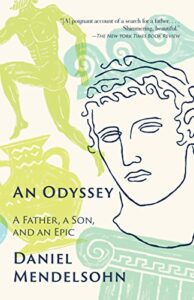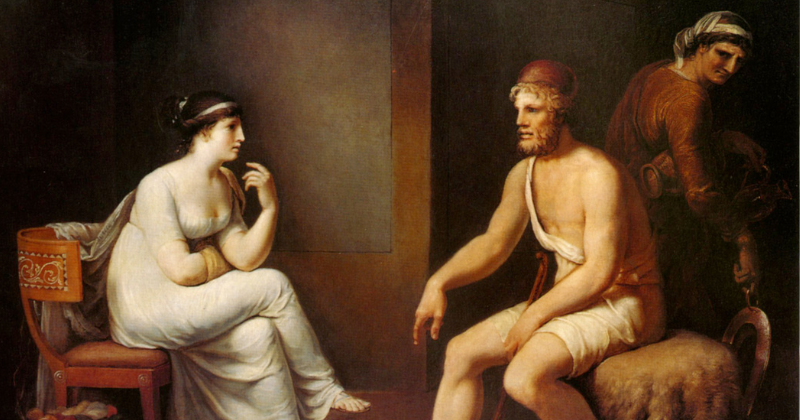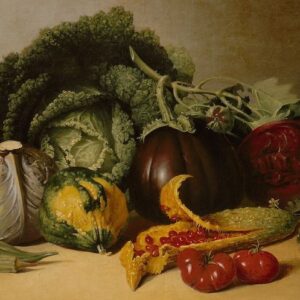How The Odyssey Helped My Father and Me to Grow
Daniel Mendelsohn on His Father and Making Lessons That Live On
Excerpted from An Odyssey: A Father, A Son and An Epic by Daniel Mendelsohn
One of the strange things about teaching is that you can never know what your effect will be on others; can never know, if you have something to teach, who your real students will be, the ones who will take what you have to give and make it their own—“what you have to give” being, in no small part, what you yourself learned from some other teacher, someone who wondered whether you would absorb what she had to give, someone who is, by the time you’re old enough to write about the experience, as old as your parents, perhaps even dead—can never really know which of the young people clustered around the seminar table is someone whom the teacher or the text has touched so deeply, for whatever reason, that the lesson will live beyond the classroom, beyond you.
But then, the process of education, of pedagogy, of leading a child into knowledge, is a delicate and unpredictable one, its mechanisms and effects often mysterious to student and teacher alike.
For instance:
On the mild day in mid-May when Classics 125: The Odyssey of Homer ended, I was convinced that this experiment—having my father sit in on the seminar, an idea that so many of my and my parents’ friends had found so charming, so amusing—had borne no fruit. By the time we got to that fine spring day, so long after the January morning on which my father pulled up to my house in the snow, grimacing, after the bitter month of February in which we talked about the Telemachy and what it told us about the “harmonious molding” of that young character’s soul, after the wet month of March when we talked about Odysseus’ sojourn among the Phaeacians, filled as it is with stories and lies, with the hero’s narration of his fabulous adventures, the Apologoi; after that freakishly cold April when we analyzed the series of recognitions that marked the hero’s return to his home and his true identity—by then, I’d become convinced that I had failed to teach my father. I had never found a way to persuade him of the beauty and usefulness of this great work, whose hero he still didn’t find very heroic, whose structural ingenuities left him cold, whose famously fascinating protagonist had failed to fascinate him.
And indeed, at a certain point after that semester ended I forced myself to acknowledge that, in precisely the way that I had been mortified many years earlier by my father’s rough table manners, had felt the complicated shame that eventually pushed me when I was a teenager toward all those mentors, some of whom were exemplary teachers and some of whom were not, I had been slightly embarrassed by my father.
I worried that my students had, in the end, been put off by his gruff attitude toward the text and confused by his evident disdain for my teaching of it. I squirmed inwardly when I thought of what they must have made of the bald and withered old man hunched in the corner each week, his baggy white sweater only emphasizing how shrunken his limbs were, as he grumbled and argued and contested the points I was eager for them to absorb.
During the course of the semester, there had been only one occasion on which my father had charmed the class in the way that, so effortlessly and surprisingly, he would charm the passengers on the Odyssey cruise just weeks after the course ended; only one moment between January and May when he revealed one of those sudden and unexpected softenings that, when I was a child, I used to wish would come more frequently—as on those nights when, instead of staying bent over the small wooden desk in the hours after dinner, muttering at the bills, he would stand up with a sigh and walk across the narrow hallway into my room and then, after doing a super-duper-tucker-inner, would sit at the edge of the sturdy wooden bed that he had built and read Winnie-the-Pooh aloud to me. I would lie there in bliss, cocooned like a mummy, unable to move my arms but nonetheless feeling safe, as his high nasal baritone wrapped itself around the short, straightforward sentences that, many years later, he would try and fail to pick his way through during one of his periodic attempts to revive the Latin he had once forsaken.
Winnie ille Pu.
There was only one time during the spring semester of 2011 when my father revealed this other face, which I would see so much more often, so unexpectedly, during the Odyssey cruise. This strange moment occurred on the second Friday in Ma—the final meeting of the seminar, when we were talking about the culminating reunion between Odysseus and Penelope, which takes place immediately after his vengeful slaughter of the Suitors.
For weeks I had been preparing the students for this climax, which is also the climax of the epic’s ongoing preoccupation with identity and recognition. The Greek word for “recognition” is anagnorisis, I’d told them, explaining that this is a key term in the vocabulary classicists use when talking about how plot works. Aristotle in his Poetics, for instance, says that certain plots in tragic drama pivot on a moment of anagnorisis, and others pivot on a sudden and total change of fortune, or metabasis; but the best kind of plot, Aristotle says, is the kind in which the moment of recognition is also, simultaneously, the moment of reversal of fortune. For Aristotle, Sophocles’ Oedipus Rex is the ideal play in part because it effects this double plot: Oedipus’ recognition that his wife is really his mother is also the moment of his downfall.
But this twinning of recognition and reversal happens in the Odyssey, too, although there the outcome is a happy one: the moment when Odysseus’ true identity is recognized is also when his fortunes are restored and he wins back his wife, his family, his household, his kingdom.
The recognition scene between Odysseus and Penelope is also the culmination of another of the epic’s ongoing themes. I reminded them of all the other females who had enticed Odysseus during the course of his long journey home, mortal and immortal: of Calypso and Nausicaa and Circe, all of whom were alluring alternatives to Penelope, alternatives that, in the end, he rejected.
Those transformations, metamorphoses that, whatever their charm or their value for the plot, force the reader of the Odyssey, in the end, to wrestle with the question of just how it is we know who someone is when outward appearances can no longer be relied on.I had reminded them of Odysseus’ pointed use of the word homophrosynê, the “like-mindedness” that he recommends in Book 6 to the Phaeacian princess as the hallmark of an authentic relationship, a true marriage, the very quality that was lacking in his entanglements with the goddesses with whose beauty Penelope could never hope to compete.
I reminded them of the many physical transformations that had been effected throughout the poem, starting with Athena’s transformations, first into Mentes and then into Mentor, continuing with the disguise that Odysseus uses to sneak into Troy during the escapade that Helen recalls in Book 4, going on to include the way that Athena beautifies Odysseus in order to impress the Phaeacians in Book 6 and the way in which she makes him wizened and ugly once he returns to Ithaca, in Book 13, the better to deceive the Suitors, who are indeed fooled by the appearance of the bald, shriveled old man in their midst, a great hero in disguise.
I had reminded them of all those transformations, metamorphoses that, whatever their charm or their value for the plot, force the reader of the Odyssey, in the end, to wrestle with the question of just how it is we know who someone is when outward appearances can no longer be relied on.
And now here we were, in May, at the end of the semester, discussing the long-awaited reunion between the husband and the wife. This tender scene follows, with almost jarring swiftness, the slaughter of the Suitors, the two moments grotesquely twined into a double climax reflecting the poem’s ongoing, paired concerns, the ethical and the emotional, the
public and the personal: the Suitors’ blasphemous insult to the laws of hospitality, on the one hand, and the status of Odysseus’ marriage, on the other, the question of whether husband and wife will be able to know each other again.
The close relationship between the vengeance narrative and the recognition theme is evident in the fact that the slaughter of the Suitors results from an idea that Penelope comes up with. At the end of Book 19, following the queen’s long and emotional conversation with the beggar and after Eurycleia’s recognition of Odysseus’ scar (the old nurse wants to alert Penelope, but Odysseus swears her to silence), Penelope declares that the next day will decide her fate at last. For on that day she will set a contest for the Suitors—a test of skill whose winner, she says, she will be happy to marry.
The contest is in fact designed to ensure that whoever wins will have at least some of her husband’s remarkable qualities, since it involves accomplishing a tricky feat that Odysseus liked to perform in days gone by: to shoot an arrow through a series of twelve ax-heads lined up in a row.
Since merely to string the mighty horn bow requires enormous physical strength, Penelope’s future husband will not, at least, be a weakling. Penelope announces the contest to the Suitors in Book 21, and it soon becomes clear that, whether consciously or unconsciously, she has devised a way to put a weapon into the real Odysseus’ hand. Odysseus, for his part, has been conniving to better his chances against the Suitors for some time now, seeing how vastly outnumbered he and his son and their pathetically few allies are—the loyal Eumaeus, to whom he at last reveals himself, another old farmhand, a cowherd named Philoetius, and of course the devoted Eurycleia.
Soon after his reunion with Telemachus, he orders his son to lock away the Suitors’ weapons in an upper storeroom while keeping his own arms at the ready; now, as the time for Penelope’s contest draws near, he instructs Eurycleia to lock herself and the other womenfolk in their quarters and tells the cowherd to slip outside and bolt the palace gates so no one can get in or out. But how to get weapons into his own hands? The contest of the bow at last provides a pretext.
Like Cinderella’s sisters trying on the glass slipper, one Suitor after another tries to string the bow and fails. Finally, the “beggar” offers to have a try, much to the derision of the Suitors. Antinoüs wheels on him: how outrageous for someone as lowly as he to insert himself into the proceedings! Here Penelope herself slyly intervenes—suggesting, at least to some readers, that she has known all along that the beggar is her husband.
Does Antinoüs really think, she laughingly declares, that she’d marry the old drifter if he wins? Certainly not. But since everyone else has failed, could it really hurt to let the old man have a go? Despite the mutterings and imprecations of the disgruntled Suitors, loyal Eumaeus takes the great weapon and carries it across the crowded room to the beggar, into whose hands he places it.
Odysseus picks up the weapon, testing it to see whether “the worms have been at the horn in its master’s absence.” Then, finding it sound, in one fluid motion—as graceful, Homer says, as a bard stringing his lyre—he strings it. At which point,
from the Suitors there rose up a mighty groan, their skin
turned white; and Zeus let crash a mighty thunder-sign,
while much-enduring, godlike Odysseus rejoiced
that wily Cronus’ child had sent this portent.
An arrow lay there on the table—he took and let it fly;
the others, still within the quiver,
the Achaeans soon would taste.
And then the mayhem begins.
The jarring reference to the Suitors as “Achaeans”—the word Homer uses to refer to the Greek allies in the Iliad—prepares us for the fact that, however much the Odyssey has been preoccupied till now with its hero’s ability to use his wits to conquer his enemies, the climactic act of vengeance for which he has waited so long will be characterized by the kind of violence we associate with this poem’s great predecessor.
After stripping off his rags and declaring to the astonished Suitors his true identity, he takes aim first at the loathsome Antinoüs; the arrow he shoots catches the leader of the Suitors in the throat just as he’s downing a cup of wine—a fitting ending to the character who, more than any other, emblematized the Suitors’ arrogance and impiety in defying the laws of hospitality. “You dogs,” Odysseus explodes at last,
you never thought that I’d be home again
from Troy! And so you ate my household up,
forced yourself upon the servant girls,
courted the wife of a man who was still alive,
outraging the gods who hold up the wide heavens
as if no one would ever take revenge:
now dire destruction waits for all of you!
Eurymachus dies next, after trying to smooth-talk his way out of his predicament (he blames everything on Antinoüs), and then poor Amphinomus, speared through the back by Telemachus as he tries to flee the hall. But the vengeance that ensues doesn’t, at fi rst, go quite as Odysseus had planned. In a final nod to the theme of Telemachus’ education, Homer tells us that the youth has made a near-fatal mistake at this critical moment: he’s left the door to the storeroom where he’d stashed away the Suitors’ arms wide open, and for this reason they eventually manage to don their armor and defend themselves from Odysseus’ onslaught.
When Odysseus learns of this deadly error, he assumes he has been betrayed by one of the Suitors’ allies among the servants; but Telemachus admits that the mistake was his. Interestingly, Homer cuts away at this moment, and so we never know what his father’s reaction to the news of his son’s error is.
On the first Friday in May, when we discussed this passage in class, my father raised his hand.
So Telemachus nearly ruins it all, he began.
Oh, God, I thought, here it comes.
But then he said, It’s very impressive that he admits it was his fault. He could have gotten out of it and let his father think it was the servants’ fault, but he owned it. So maybe this is really the culmination of the theme of his education. He proves he’s a grown-up by taking responsibility.
Tommy cut in before I could reply.
Well, he said, I think it’s just as interesting that Odysseus seems to let him off the hook—he doesn’t say anything, doesn’t scold him. So maybe he’s learned something, too.
Whatever its significance for the father-son theme, Telemachus’ mistake makes possible a genuine battle scene straight out of the Iliad; the bloodshed continues for the next two hundred lines, with a few key interventions by Athena to keep the odds on her favorite mortal’s side. (You see? my father cried for the last time that semester. He only wins because he gets help from the gods!)
Finally, Odysseus scans the carnage to see whether any Suitors are left breathing. But no; all are dead, lying in the gore like
fishes that the fishermen have hauled
from the iron-gray sea onto the winding shore
meshed in the intricate nets; and they, the fish,
lie there on the sand, croaking for the salty waves,
but the blazing Sun beats the life from them …
An undignified simile for an unworthy group of men.
It is only after the gore has been cleaned up and the palace ritually purified that Odysseus encounters his wife once more and finally reveals his identity to her.
And yet, as with the scene in Book 16 that reunites the father and his son, the reunion between husband and wife in Book 23 starts off with a disconcerting anticlimax. Penelope, we are told, has slept through the mayhem; now she is waked by Eurycleia, who announces the great news to her mistress—Odysseus has returned and killed the Suitors! But to the nurse’s bewilderment and to the stupefaction of Telemachus, the queen doesn’t believe a word of it. Indeed, she turns out to be as suspicious and wary now as her husband has been throughout the poem.
Her cautiousness in this scene, so like Odysseus’, is simultaneously a marker of the couple’s genuine like-mindedness, homophrosynê, and a frustration for Odysseus, that notorious deceiver and trickster, who finds himself in the odd position of not being believed when he finally wants to be—when he is finally telling the truth.
________________________

An Odyssey: A Father, A Son and An Epic by Daniel Mendelsohn was shortlisted for the 2017 Bailie Gifford Prize for Nonfiction. Used with permission for the publisher, Vintage in the US and William Collins.




















